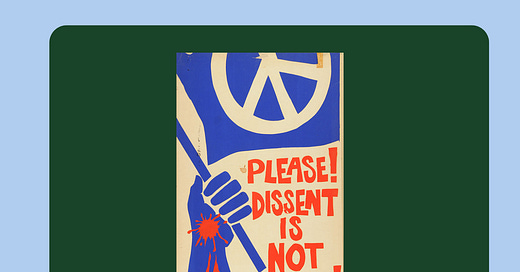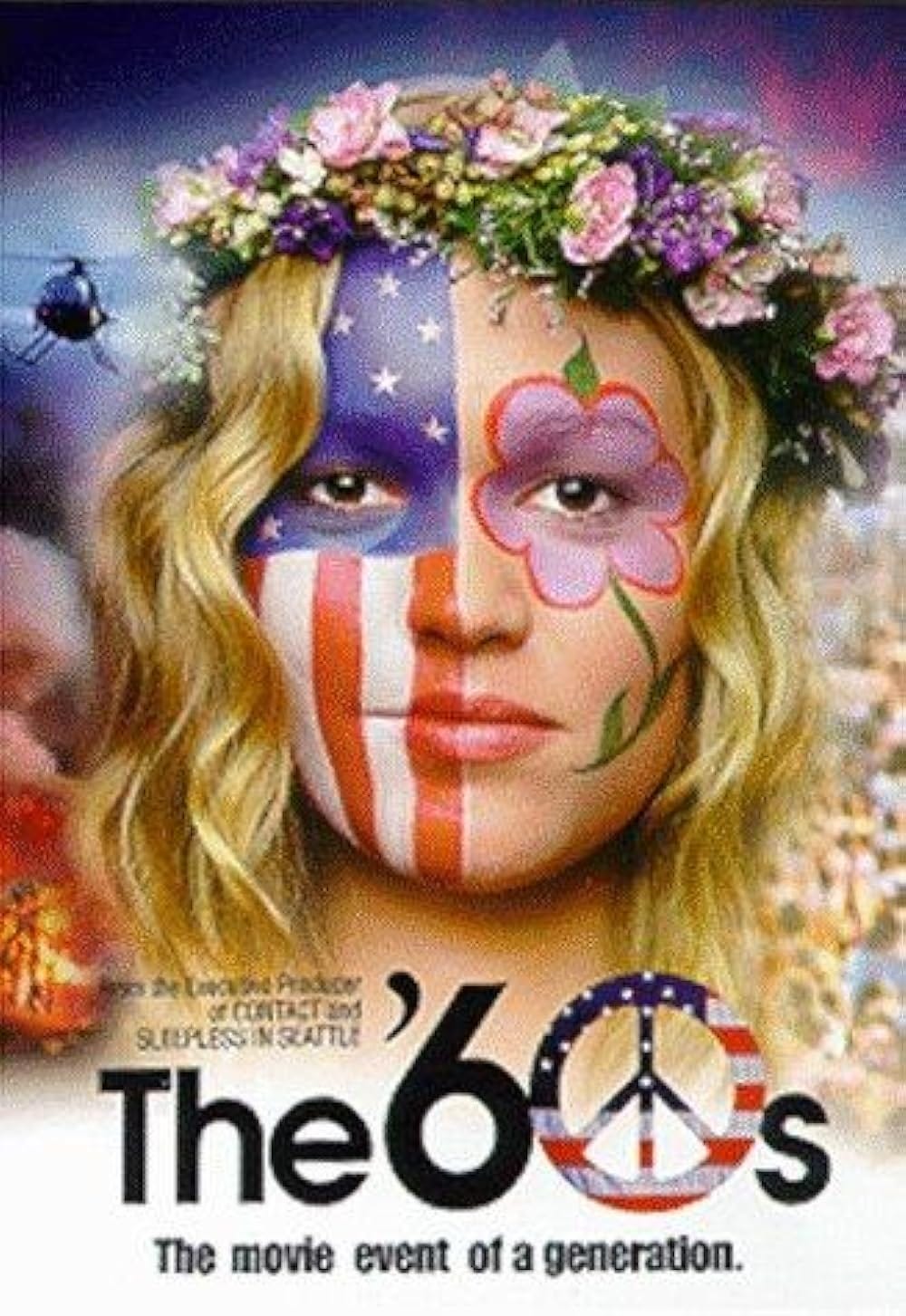Mini-Syllabus: Histories of Student Activism
A Historical Perspective on Student Activism: What 1968 Can Teach 2024
This is a free post for subscribers of Landline. Consider subscribing to the paid plan to get my weekly email of recommendations and links, a podcast episode, and more! You can also help me spread the word by sharing it with a friend who would love it.
I have been watching the student protests across the country this week, and have been struck in particular by the dissonance between the stories campuses tell about their history and the actions they’ve taken to maintain order in reaction to students protesting peacefully. This tweet by Alejandra Caraballo calls out the kind of dissonance I’m thinking about:
This is the page Alexandra screencapped. It begins, “Columbia is a far different place today than it was in the spring of 1968 when protesters took over University buildings amid discontent about the Vietnam War, racism and the University’s proposed expansion into Morningside Park.”
Similar to today, students on college campuses held protests in 1968, a fact that universities like Columbia now celebrate in their college archives by collecting, curating, and making available artifacts of that moment in our national history. In 1968, students protested, occupied buildings, and held teach-ins inspired in part (but not entirely) by discontent over the Vietnam War, lack of access for students of color to admissions or scholarships, and extractive relationships between campuses and the communities in which they are located.
History never repeats, so we cannot say 2024 is a mirror of 1968. However, I want to share some sources from 1968 in case anyone is new to that moment in history and wants to read, watch, and listen to artifacts of that time to better understand what’s happening now.
I am including some documentaries from 1968 that followed journalists who covered student protests. The journalists were working for a show that was a precursor to PBS’s Frontline. It feels so obviously groan-worthy to watch how “adults” tried to both accurately present student concerns while also completely condescending to and trivializing them. I’ve always believed people underestimate college students at their own peril. If nothing else, college students have a long history of calling out contradictions (on campus or beyond) and being open enough to imagine a different way of doing things. The pushback to this and the performance of condescension in these documentaries by journalists and administrators is both cloying and familiar. In 1968, students protested universities conducting research to benefit the war in Vietnam. Today, students are calling for colleges and universities where they pay tuition to divest from investments that support actors funding the genocide in Palestine. While the 1968 and 2024 protests are about different causes, they both rely on the implication that our investments (emotional, intellectual, or financial) matter, and should be intentional and reflective of our shared beliefs. When universities claim to have “core values” wrapped up in their mission statements, they can’t act shocked that some students want to hold them to account or at least talk about it. I mean, isn’t that why they are there? To learn how to think? (Not to sound like an ad for college, I’m really at a point of questioning higher ed in its current form.)
I was struck by the performance of “professionalism” this week by my own alma mater, the University of Connecticut, where I got my Ph.D. As my friend Jordan noted, just weeks ago, students were allowed to camp out overnight for basketball tickets. Now, that act has been labeled a violation of policy warranting some 80 police officers to arrest and remove 23 students. Make it make sense.
I always turn to history to understand whatever is happening here *gestures at chaos around me*. Because here’s the thing: History isn’t really about memory. It’s mostly about not forgetting.
Here’s a mini-syllabus of things I find useful and interesting.
Mini-Syllabus on Histories of Student Activism
If you never learned about 1968 but want some context:
The American Yawp (a free collaboratively built American history textbook)
Jump to the chapter 27 “the Sixties” and chapter 28 “the Unraveling”
or read:
Jefferson Cowie. Stayin’ Alive: The 1970s and the Last Days of the Working Class
Joan Didion. The White Album: Essays
William O’Neill. Coming Apart: An Informal History of America in the 1960s
Robert Self. All in the Family: The Realignment of American Democracy Since the 1960s
Jeremi Suri. The Global Revolutions of 1968
Primary Sources (Interesting things from the era of the 1968 protests)
Protest Signs (Kent State University)
Explore these campus protest signs from across the country. They were gathered by the Kent State University Commission on Violence. After the infamous shooting at Kent State on May 4, 1970, University Libraries sent letters across the country to schools asking for materials that documented student unrest. (Librarians and Archivists are often who we have to thank for documenting our history.)
Gidra. (Asian American Student Zine)
From Purdue’s Lib Guide: “Five students from the University of California, Los Angeles (UCLA), wanted to begin their own newspaper focused on Asian American issues. The university refused to fund the publication, so the five students pooled their money and published the paper on their own. The result was a self-published student newspaper called Gidra, which ran from 1969-1974. . . .Considered "the voice of the Asian American experience," Gidra covered various issues affecting Asian American communities at UCLA and the surrounding city of Los Angeles. As a self-published, small-run publication, it is considered one of the most influential zines of the Asian American movement in California during the late '60s and early '70s. All issues of the zine are now digitized and can be viewed for free through the Densho Digital Repository's Gidra Collection.” (Purdue University)
Documentaries
Color Me Black! (1968) (Bay Area Television Archive, San Francisco State University) A documentary produced for NET exploring how and why Howard University (Washington D.C.) was shut down by African American students, who occupied the Administration Building over four days in March 1968.
From Protest to Resistance (1968) (PBS) A documentary film from 1968 produced by the KQED Film Unit, which in the words of narrator Richard O. Moore: "Is about three veterans of Mississippi [of the Civil Rights movement] who have become peace spokesman for the new opposition activist.
Diary of a Student Revolution (University of Connecticut). National Educational Television documentary showing the dramatic behind-the-scenes struggle between President Homer D. Babbidge and the UConn protesters demonstrating against on-campus employment recruiting by Dow Chemical Company on the Storrs campus.
Colleges on their own histories:
“1968 and its Afterlives” (Barnard College)
“Anti-War Protest and the Kent State Shootings” (Oberlin Sanctuary Project)
“1968 Columbia in Crisis” (Columbia University) A 2008 digital exhibit on the 1968 student protests. It makes me wonder how they will document this moment and present it later.
Student Demonstrations Collection (Smith College)
Pop Culture Interpretations:
Watch:
Getting Straight trailer (1970) A film starring Elliot Gould and Candice Bergen and ostensibly about campus protests. It follows one man’s attempt to understand student activism after he returns to school after serving in Vietnam. TW: gay slur used in the trailer.
Then read: “Miss Bergen protests - but not too much” (July 24, 1970, Life Magazine) A profile of Candice Bergen in support of Getting Straight which offers an interesting example of a celebrity trying to negotiate political activism and PR. The cover describes her as “activist actress Candice Bergen.” (Also just a fascinating window into this moment).
I am obsessed with this story from Life Magazine: “The Class of ‘69: With eloquent defiance, top students protest right through commencement” It pairs graduating seniors’ frank comments about the state of society and protests with faculty/speaker responses. It offers a really striking exploration of the generational divide and how that framed approaches to campus unrest. You may notice a not-yet-famous graduate included in the student reflections. One of the graduates, Stephanie Mills, would deliver a valedictorian address that year entitled “the future is a hoax.” #bleak
One Definitely Not Academic Source:
Thank you to the hero who posted The ‘60s tv miniseries from 1999 starring Julia Stiles and Jerry O’Connell. It is wild, insane, and not remotely serious (though it plays that way). It also includes an iconic recreation of the Columbia University protests (among every other major event in the ‘60s in a truly of-its-moment Forrest Gump approach to covering history on film). You can view part 1 and part 2 on YouTube.
Student Journalists Today
To learn about what’s happening now, I want to shout out student journalists covering events on their campus. Here’s a sampling of papers I’ve been reading this week:
Columbia Daily Spectator (Columbia University)
Daily Bruin (UCLA)
The Daily Texan (University of Texas at Austin)
The GW Hatchet (George Washington University)
Trinity Tripod (Trinity College)
Call Me! (or not!)
I’d love to hear from you! Drop your thoughts in the comments to share with the Landline community, or reply to this email to contact me. You can also find me on Instagram, or email me. I don’t have a dedicated phone line yet (just like in my youth), but maybe someday I’ll achieve Claudia status and get a Landline.
Thanks for reading!
This is a free post for subscribers of Landline. Consider subscribing to the paid plan to get my weekly email of recommendations and links, a podcast episode, and more! You can also help me spread the word by sharing it with a friend who would love it. Thank you for being a friend!











Thank you so much for this! So helpful for whenever I need academic proof to remind people how students have done this in the past, and now we approve of it in hindsight.
OMG the person who posted the 60s!!! I had a VHS copy in high school but my sister taped over it with NSync. And thanks for the link to the Gidra Zine.